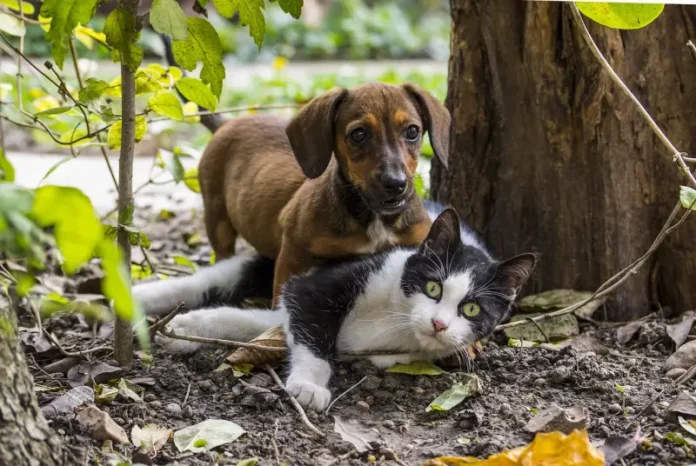Fostering Harmony: Ensuring Peaceful Coexistence Between Dogs and Cats
In many households, dogs and cats can develop remarkable friendships, but their interactions can also pose challenges for pet owners. As a professional dog trainer, I regularly encounter fraught relationships between these two beloved species. This article will explore how to create a harmonious household with both a cat and a dog. It’s vital to choose the right dog breed and understand behavioral genetics to foster a positive dynamic.
Understanding Canine Behavior: Genetics Matter
While many pet owners believe that behavior is solely shaped by upbringing, the reality is that a dog’s genetic predisposition plays a significant role in its behavior. Different breeds are wired with specific drives based on their historical roles:
- Hunting Breeds: Dogs like terriers and pointers are instinctively driven to chase small, fast-moving targets, such as cats.
- Herding Breeds: Breeds such as Border Collies and Australian Shepherds may exhibit stalking behaviors, making them less compatible with feline friends.
- Companion Breeds: Small breeds, in contrast, typically have low prey drives, making them more suitable for homes with cats.
Dog Breeds to Avoid if You Have Cats
If you are a cat owner considering adding a dog to your household, it’s critical to avoid breeds known for their strong predatory instincts. Some breeds that are particularly unsuitable include:
- Huskies
- Pitbulls
- Australian Shepherds
- Border Collies
- German Shorthair Pointers
- Weimaraners
- Belgian Malinois
- Australian Cattle Dogs
- Greyhounds (especially rescued racing Greyhounds)
- Most Terriers
These breeds tend to have intense prey drives, leading to potential conflicts with cats. Consequently, many owners find it challenging to safely introduce these dogs to their feline counterparts.
Choosing the Right Dog: Breeds That Get Along with Cats
When selecting a dog, consider breeds that generally have a gentle disposition towards cats. Companion dogs often make great choices, including:
- Bichon Frise
- Cavalier King Charles Spaniel
- Maltese
- Pomeranian
- Pug
- Pekingese
- Chihuahua
- Shih Tzu
These breeds are typically calm and less likely to engage in chasing behavior, making them ideal companions for cats. However, supervision during initial introductions is essential to ensure a positive relationship.
Key Considerations When Introducing a Dog to a Cat
Timing plays an important role in ensuring successful introductions between your dog and cat. Be mindful of the puppy’s energetic peaks, often referred to as the “witching hour.” These periods can lead to overly excited behavior, which could overwhelm your cat. Here are some tips for managing these interactions:
- Keep the puppy separated from the cat during high-energy periods.
- Encourage interactions when the dog is calm, such as after exercise or training sessions.
- Monitor their interactions closely to promote good behavior and reinforce positive interactions.
Creating Positive Interactions Between Dog and Cat
Your cat will appreciate calm interactions with your dog, particularly when the dog is tired after play or training. This fosters a positive relationship that can lead to moments of bonding, such as cuddling. To enhance the friendship:
- Encourage interactions during calm periods.
- Manage and supervise their initial meetings to avoid any instances of overwhelming energy.
- Gradually increase their time together as they become more comfortable.
The Bottom Line: Setting Up for Success
The relationship between dogs and cats can be challenging, especially when high prey drive breeds are involved. To ensure compatibility, carefully consider the breed of the dog you introduce into your home. Opt for smaller breeds that tend to be relaxed and enjoy quiet companionship. By crafting positive interactions and managing their energy levels, you can help your dog and cat coexist peacefully, potentially becoming the best of friends.
About the Author
This article was written by Steffi Trott, owner and founder of SpiritDog Training. With a focus on positive, game-based training solutions, Steffi’s expertise lies in providing effective online and in-person training strategies for dog owners. In her free time, she enjoys competing in dog agility and exploring the New Mexico and Colorado wilderness with her own four dogs.












